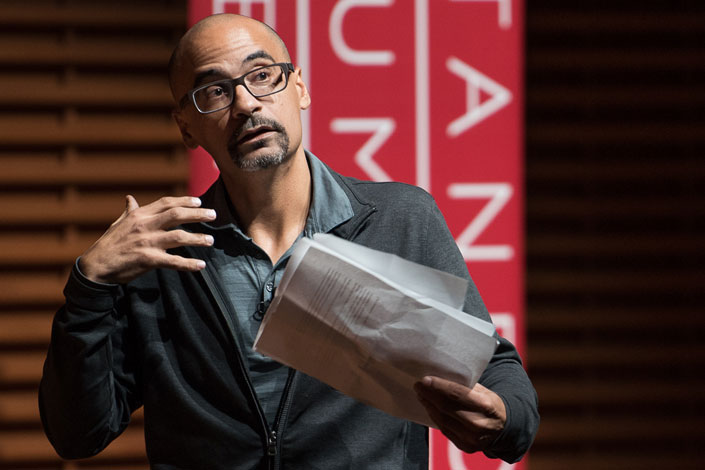On Wednesday evening, Junot Díaz delivered the 2017 Stanford Presidential Lecture in the Humanities and Arts. Díaz is a Pulitzer Prize winner and the recipient of a MacArthur “Genius” Fellowship, as well as the author of a variety of critically acclaimed books such as “Drown,” “The Brief Wondrous Life of Oscar Wao” and “This Is How You Lose Her.”
Díaz’s address focused on problems with university institutions, the marginalization of certain communities and the current national political climate.
“I was drawn and motivated and passionate about intervening in this new political climate which seems to distract from the corrupt practices of our elite,” Díaz said. “We really need to fight in ways that we have never fought before. These are not easy times and it requires tremendous courage. Fortunately, most of the young people involved in these fights are the greatest things that I have ever seen.”
Díaz also offered advice for marginalized students at universities, speaking to the unique obstacles that students may face. He noted that “it’s not all of us who are reenacting the cover photograph of a college recruitment brochure.”
The first piece of advice Díaz offered to students is to seek understanding of the how the university functions as an institution and overall system.
“Get yourself a definition of neoliberalism,” Díaz said. “Get yourself a definition of patriarchy. Get yourself a definition of Orientalism. Get yourself a definition of white supremacy. And you certainly need a definition of feminism.”
Next, Díaz told attendees that it is important to build collectives and maintain connections with others. The author stressed the importance of solidarity, noting that students should “get in the business of fighting for each other’s freedoms.”
To maintain self-care in the midst of education and activism, Díaz emphasized the importance of mental health, which may involve using campus resources, getting a therapist or reaching out to one’s own communities, among other practices.
Another important piece of self-care, Díaz said, involves learning about healthy systems of “reconstitution,” or rebuilding oneself.
Students can also struggle with practicing compassion for themselves, Díaz said, warning that “the whip only works for a short period of time. You cannot force yourself beyond the limits of human endurance.”
He reminded attendees that there are ways to change problems and accomplish tasks that do not involve fear and pain, and noted the need to help others in times of distress. Helping people, Díaz said, will give more perspective than anything else.
Díaz ended by reminding the students in the audience of their unique opportunities as young people with “incredible agency” during college.
“You are here to steal fire,” Díaz said. “That is your goal. That is your mission. And that is what will hold you to this difficult task. We must steal fire because we must transform this world.”
Contact Sophie Stuber at sstuber8 ‘at’ stanford.edu.
